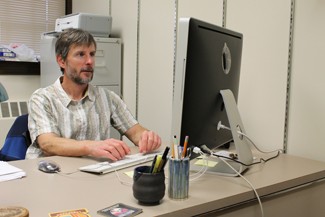Biology Department offers opportunity for students to spend summer doing research
Some students look forward to summer as a time to relax and forget about school, but for others summertime provides an opportunity to further explore a chosen field.

Daphne Jackson | Argonaut
Dr David Pfeiffer, director of the University of Idaho’s Research Experience for Undergraduates. The application deadline for participants is Monday, Feb. 23.
For 10 science-minded undergraduate students, this summer will be a chance to conduct research in real time.
The University of Idaho Department of Biological Sciences will host a 10-week summer research program for undergraduates, funded by the National Science Foundation.
David Pfeiffer, director of the UI program, said the Research Experiences for Undergraduates (REU) Program has sites in universities across the country, but this will be the first time it’s come to UI.
“I’d actually run several of these programs at my former institution,” Pfeiffer said. “And then once I moved into this department, I was looking around, interested in getting more undergraduates involved in research and looking at the strengths of this particular department, the department of Biological Sciences, and one of the real strengths here is this theme of molecular and organismal evolution.”
Pfeiffer said the program has 10 spots open to students from other universities as well as UI students. Each student in the program is paired with a faculty researcher from within the Biological Science Department and students spend the majority of their time working in various labs with their assigned researchers.
“They design and then conduct their own research experiments based on that research sort of fitting into the general research of that particular lab, so there’s a wide range of projects,” Pfeiffer said. “Most of (students’) work will be dedicated toward conducting their own research projects, but then the program itself provides other things for these students.”
In addition to the research and lab work, Pfeiffer said participating students will have a weekly seminar series and a weekly series in “professional development” to help students learn about things like applying for graduate school, presenting data and searching primary literature.
Online applications for the program are due Monday. The 10 successful applicants will receive room and board, a $5,250 stipend for the summer and — for students from out of state — round-trip airfare.
The Biological Sciences Department will initially screen applicants based on academic criteria — GPA, a minimum course sequence of biology and chemistry — and a personal essay, which Pfeiffer said should indicate the seriousness of the application. After this process students will have phone interviews to further narrow down the group of applicants, Pfeiffer said.
“The selection criteria gets down to matching students with projects to try to find a good fit for the students,” he said. “Rather than taking students saying, ‘You will work in this lab on this project,’ we ask the students when they’re applying to select three mentors, and we give descriptions of what people do, three mentors that they would like to work with.”
Pfeiffer said he found the mentors by evaluating which research falls within the general theme of molecular and organismal evolution, and approaching faculty members who potentially fit the framework. He said he spoke to 15 or 16 faculty members, all of whom were interested in participating.
“That gives us more mentors than spots, which is actually nice, because it allows mentors, they don’t have to commit — they can cycle in and out of the program year after year,” he said. “So sometimes they can be a mentor one summer, and then the next summer, if they’re on sabbatical or some other issue’s keeping them, it doesn’t work, then they don’t have to be a mentor.”
In choosing mentors for the program, Pfeiffer said he was also focused on choosing faculty members who have experience working with undergraduates, and was relieved to discover all the selected mentors had that experience. He said most of them have undergraduate students and graduate students already working in their labs.
Daphne Jackson can be reached at [email protected]
